The Supreme Court on Wednesday (January 3) refused to order a probe by a Special Investigation Team (SIT) or the Central Bureau of Investigation(CBI) into the allegations levelled in the Hindenburg Research report regarding stock price manipulations by the Adani group of companies.A three-Judge bench comprising Chief Justice of India DY Chandrachud, Justices JB Pardiwala and Manoj Misra...

